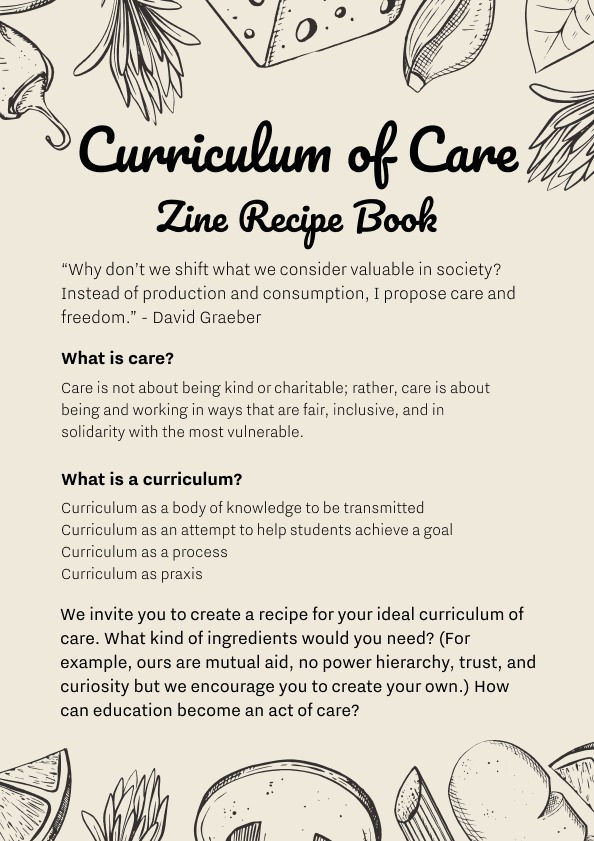Week 4: Visual Assembly
- vickisun4
- Jul 11, 2022
- 3 min read
Updated: Jul 31, 2023
May 23 to May 27, 2022
Partners: Anya, Bipasha, Dany, Farah, Faiza, May, Sofia, Ziyuan, This Ain't Rock n Roll
Brief: Design and facilitate a Visual Assembly on the topic of The Curriculum of Care
Define Key Terms: Curriculum and Care
From our workshops the previous week, we knew that we ourselves had to be very clear about the definitions of curriculum and care before we could instruct participants in creating their own curriculum of care.
Zine Workshop
As a result of looking at punk posters, we came up with the idea of a zine workshop. Zines are often used in punk and anarchist movements to share art and information, such as instructions on community gardens or other mutual aid movements. The content of zines can include a wide range of creative activities, such as poetry, art, collage, and scrapbooking.
The zine workshop would also allow participants to create their own vision of care, rather than the formal printed institutional model. There are no rules around zines, as compared to traditional magazines.
Zine Recipe Book
For the zine workshop, we wanted to develop a zine recipe book, taking inspiration from the Protest Cookbook (https://www.behance.net/gallery/139849561/Protest-Cookbook?tracking_source=search_projects%7Cprotest%20design). We thought the metaphors of values as ingredients and recipe for curriculum might make it easier for participants to understand the terms.
We provided definitions for curriculum and care in the introductory paragraph. The prompt was "We invite you to create a recipe for your ideal curriculum of care."

Zine Workshop
Documentation from the Zine Workshop
Participant Explaining Her Zine
Takeaway from Zine Workshop
We noticed that several of the participants still created curricula of care around interpersonal ideas of care, such as hugs or self-care. We also noticed that the workshop was more individualized rather than a community/communal activity.
We realized that we needed to be facilitating more and checking in on participants to guide them through the political sense of care.
Framing Our Questions
We started to think more about how to frame our questions.
For example, how do you provide security without a state?
Who gets left behind in these institutions?
What would an institution teach in a world based on freedom/ care principles?
Feedback
Al + Tonicha:
Al and Tonicha liked the idea of punk being reinvented because normally punk is about destroying everything. In contrast, we want to repair and put stuff back together, such as bricolage. We see care as an act of rebellion. Can care be the new punk?
They also encouraged us to think about curriculum as including both activities and environment. We don't necessarily need to use the words "care" and "curriculum." How do we elicit the responses we want without using those specific terms?
For workshops we could try to start small groups, and build it up to bigger groups. We might also have to add more constraints onto the workshop to frame the provocations in a specific direction.
John + Wan (this is mainly feedback on the zine workshop):
John and Wan encouraged us to test our language and script with other classes. They reminded us that putting the event together is the important part. John also emphasized that the outcome of the event should be legible. He suggested testing the event with a timed structure, clear instructions, e.g. print out a timetable/guide and try to use useful metaphors that are easy to understand.
He also said that we needed to be more directive in our facilitation. When people are not going in the direction we want them to, ask them guiding questions like "How long should the course be?" Clear, simple, precise instructions were key. It might be helpful to parse out specific categories within a curriculum that people can be working on simultaneously in the workshop.
Key Takeaways
We realized how design is present in every aspect of the brief, from the questions/provocations we ask to the branding to the facilitation skills.
We had to be very careful and precise in our provocations, otherwise participants would head in a direction that was not the political sense of care.
We also wanted to tread carefully between guiding participants and providing answers for them. We ultimately wanted them to reach their own definitions of a curriculum of care but it was tricky to navigate how much input we should give.













Comments